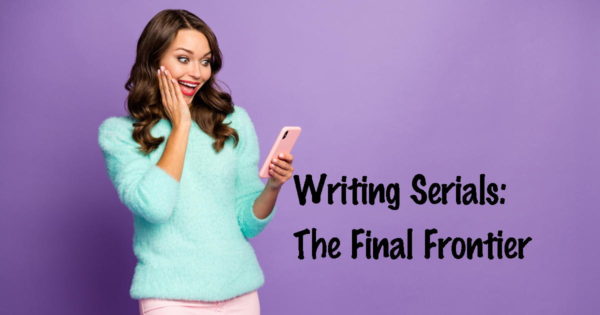 Amazon has just come out with Vella, a new format for e-novels: the buy-by-the-episode serial. For readers, it’s less awkward than it sounds logistically, and the serial novel has a long pedigree stretching back at least into the nineteenth century. For writers, it’s a whole new adventure. I’ve just wet my toes as a serial writer and thought I’d share some reflections with anyone who’s interested in being part of this new market.
Amazon has just come out with Vella, a new format for e-novels: the buy-by-the-episode serial. For readers, it’s less awkward than it sounds logistically, and the serial novel has a long pedigree stretching back at least into the nineteenth century. For writers, it’s a whole new adventure. I’ve just wet my toes as a serial writer and thought I’d share some reflections with anyone who’s interested in being part of this new market.
Pitch ‘Em Right
The best-selling genres seem to be fantasy/paranormal, romance, and YA/NA, and there are several reasons for that. The first is that the readership (so far) is mostly young people reading on their phones. They know what they want. I write neither YA nor romances nor fantasy. How will historical fiction do? It depends. Examples with elements of romance may fare fine. There seem to be some early leaders that indicate a good market if they’re the right sort of hist fic.
The second reason these genres may be more successful is that they fit the format more easily. I’ll explore that in the next paragraph.
Keep ‘Em Moving
Each episode is short—between 500 and 6000 words. Apparently, the most audience-pleasing size is in the range of 1500 words. That’s much shorter than most people’s chapters. So, think in bite-sized bits, not 20-page blocks. Each teeny-tiny episode is expected to have something happen. Imagine: something has to happen every 1500 words! For those of us who write slow burners or literary fiction, this is going to be a stretch. You may want to channel your inner thriller writer and blow things up (at least emotionally) pretty regularly. You can see how fantasy adventures or vampire romances might accommodate this need to keep things moving better than some genres.
Then there’s the idea of a cliff-hanger to close out each episode, in the hopes that the reader will be so curious they have to buy the next one.
Shape to Fit
Looking around at my colleagues’ highest-performing offerings, I can see that they’re pitched to suit the target demographic, not lure in a whole new readership. The vocabulary is breezy and not too demanding. There’s not much philosophizing going on. No tragedies. No time wasted on literary quality of style. They’re aimed, in short, at people who want to read a book in 1500-word mouthfuls. This could be off-putting if your writing isn’t like that, but it could also be an interesting exercise. Who hasn’t secretly wanted to write a beach read (that becomes a best-seller)?
One Step Ahead
The most alien aspect of serial writing for me has been the fact that each episode is gone once you submit it. At no point does the author ever have a whole manuscript in their hands. This means that whether you’re a plotter or a pantser will make a considerable difference to your sense of security. As a pantser, who discovers the end of the book when I reach it and goes back to shape the preceding part accordingly, I find this mortally uncongenial. If you have everything neatly planned out in advance, it will probably be less so. But in fact, the plot is not as likely to be tight and complex as you’re used to. Except for pacing, this format doesn’t especially encourage quality writing.
So is this the wave of the future? Are deep, slow, well-crafted books on their way out, thanks to our reduced attention span? Probably not, but serials answer to certain demands of fast-paced modern life. It would be a shame not to be open to this new adventure.

Marie Q. Rogers
I recently finished a dystopian/NA/romance which I thought would read well in episodes. So now I’m recrafting the chapters to make them work. Most of my episodes are between 1500 and 2400 words. We’ll see how it turns out!
Jack Courtney
Thanks for addressing the new Amazon format, Niki. I believe much of what you say is applicable to modern readers; I’ve noticed, for example, modern novel styles definitely go with shorter chapters and try to at least pose a question or speculation at the end of each chapter to spur readers on. I don’t think I would want to release bits of a novel until I finished the whole thing. I do too much rewriting! Thanks again.
Niki Kantzios
Good luck, Marie. Your genre sounds just right! And Jack, I think you’re right about reading trends generally. When you look at 19th-century novels and what they demand of a reader and then put them next to most modern bestsellers… well. If you’re a pantser, by all means finish the ms first and chop it up later!